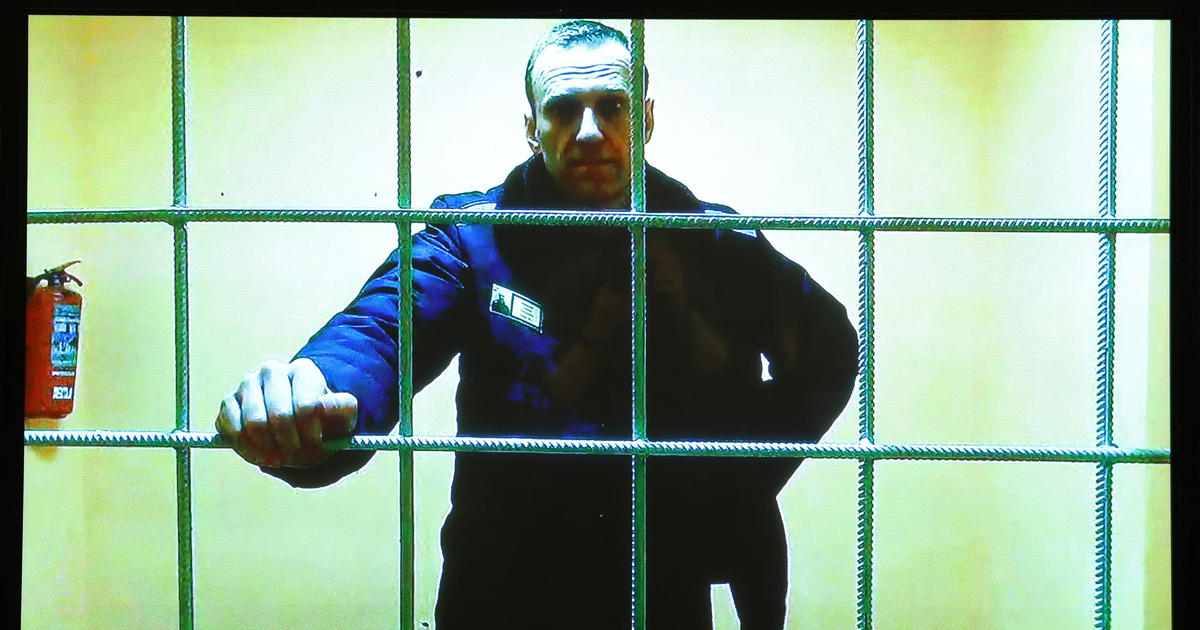Russian opposition leader and prominent Kremlin critic Alexey Navalny has been transferred from a penal colony outside Moscow to an unknown high-security prison, leaving his supporters and allies concerned about his safety. On Tuesday, top Navalny aides reported that he had gone missing from the Pokrov colony, about 70 miles east of the Russian capital, where he had been serving his 2 ½ year sentence for a parole violation.
State media quoted the Public Monitoring Commission of the Vladimir Region as saying Navalny had been moved to a prison in Melekhovo, which is just a few dozen miles from Pokrov.
Russian opposition leader Alexey Navalny is seen on a screen via video link from the IK-2 corrective penal colony in Pokrov, Russia, before a court hearing to consider an appeal against his prison sentence in Moscow, May 17, 2022.
EVGENIA NOVOZHENINA/REUTERS
Members of Navalny’s team said they had no independent verification of his whereabouts and had been unable to arrange a visit, however.
Russia declares Navalny’s opposition movement “extremist”
Navalny said during a court hearing in early May that he’d heard “a prison within a prison” was being prepared for him at the Melekhovo facility, which is infamous for its brutal conditions and reported systematic abuse of inmates.
“My sentence has not yet entered into force, but the prisoners from the high-security colony Melekhovo are writing that they are equipping a ‘prison within a prison for me,'” Navalny said after the court date in Moscow, during which he was sentenced to nine more years behind bars on fraud and contempt of court charges.
The court also ordered that Navalny be moved to a high-security facility as part of the punishment.
Visibly gaunt Alexei Navalny makes first public appearance since hunger strike
01:29
Former Melekhovo prisoners have described horrifying abuse, including rape and humiliation at the hands of both correctional officers and fellow prisoners they say were tasked with intimidating new inmates.
In 2018, a Novaya Gazeta newspaper investigation into the death of Gor Ovakimyan revealed that he likely died from injuries inflicted by Melekhovo prison guards. Penitentiary authorities first claimed Ovakimyan had died of pneumonia, but after his family shot video of severe wounds visible on his body, a criminal case was filed on death by negligence charges.
“Gor told us that they put an empty bucket on his head, put a speaker from below and turned on the music or some siren sound to a deafening effect, and sprayed gas under this bucket to make it difficult to breathe,” Ovakimyan’s father told Novaya Gazeta of the abuses his son described from Melekhovo.
“He was also hung from a lattice. His hands were pulled back behind the waist and hung like on a rack. And he would hang like that, for 10-12 hours he hung like that,” the father told the newspaper. “And why did they all do it? Because he refused to cooperate with the administration or frame someone.”
Ovakimyan’s case is just one stark example of the way inmates are said to be treated routinely at the Melekhovo prison — often dubbed a “torture conveyer belt” by local media — and other facilities in the Vladimir region. Human rights lawyers there have called for investigations into prison abuse for years.
Navalny’s representatives said they were concerned about his safety because, as long as he remains out of the public eye, it’s impossible for them to independently verify how he’s being treated.
The problem with his transfer to another colony is not only that the high-security colony is much scarier. As long as we don't know where Alexei is, he remains one-on-one with the system that has already tried to kill him, so our main task now is to locate him as soon as possible
— Кира Ярмыш (@Kira_Yarmysh) June 14, 2022
“The problem with his transfer to another colony is not only that the high-security colony is much scarier,” Navalny’s spokesperson Kira Yarmysh tweeted on Tuesday. “As long as we don’t know where Alexei is, he remains one-on-one with the system that has already tried to kill him, so our main task now is to locate him as soon as possible.”
The Kremlin said Wednesday that it “doesn’t share” the Navalny team’s concern about his transfer.
“The monitoring of convicts’ whereabouts and their transfers to various institutions of the penitentiary system is not a Kremlin prerogative,” presidential spokesperson Dmitry Peskov said at a press briefing.
Navalny was immediately arrested upon returning to Russia in early 2021 from Germany, where he spent weeks recovering from poisoning with the Soviet-era nerve agent Novichok. He blamed the attack on the Kremlin, a claim Russian officials have vehemently denied.
October 2020: Alexey Navalny describes the poisoning ordeal he says Vladimir Putin perpetrated
14:00
Shortly after his arrest, a court sentenced Navalny to 2 1/2 years in prison over the parole violations stemming from a 2014 suspended sentence in a fraud case that Navalny insists was politically driven.
He has remained President Vladimir Putin’s most ardent foe even from behind bars and has harshly criticized the war in Ukraine during his multiple court appearances.
In March, he slammed Putin as a “madman” who had launched a “stupid war” in Ukraine and said the current Russian leadership would “burn in hell” for its actions.
